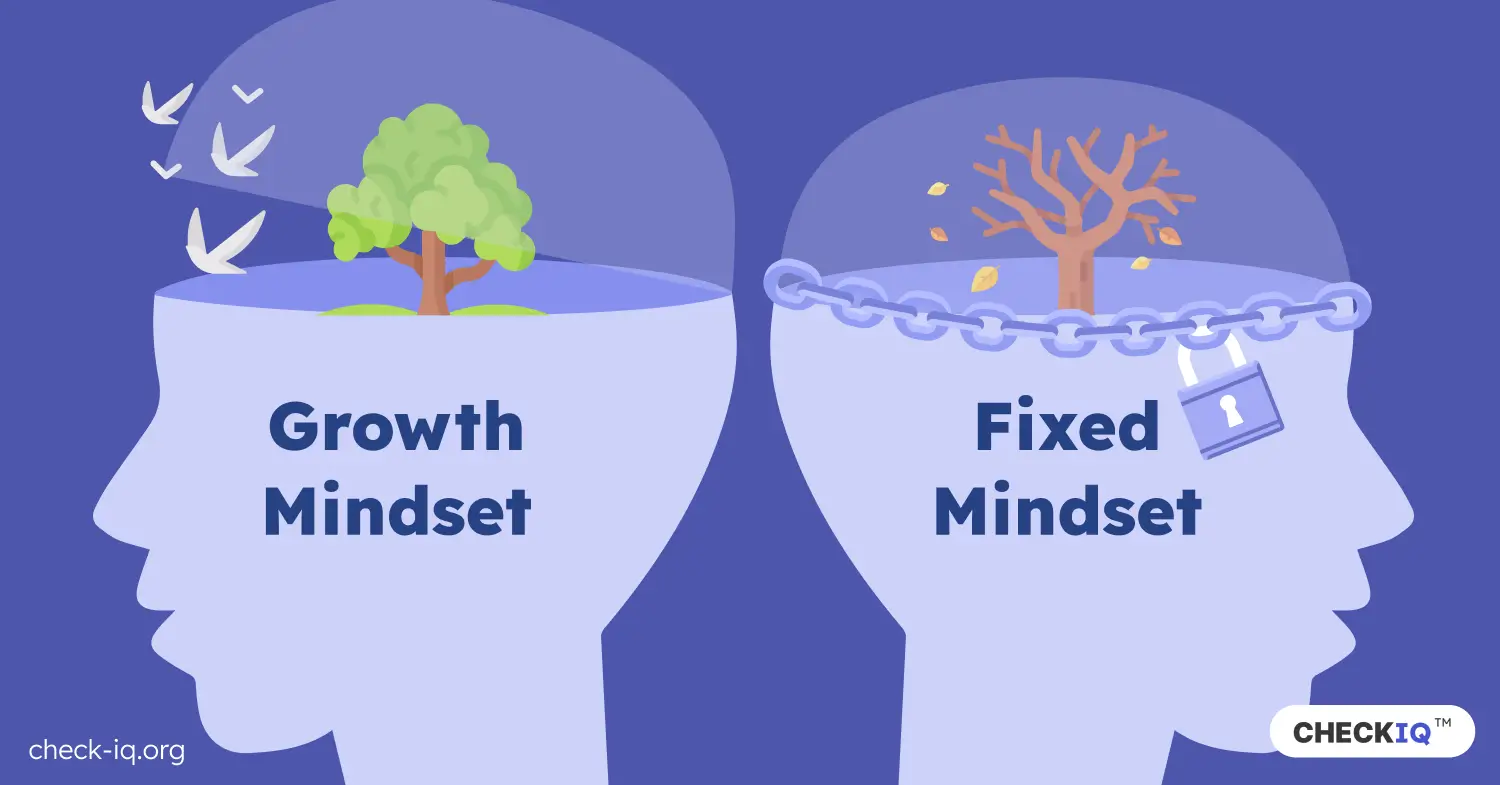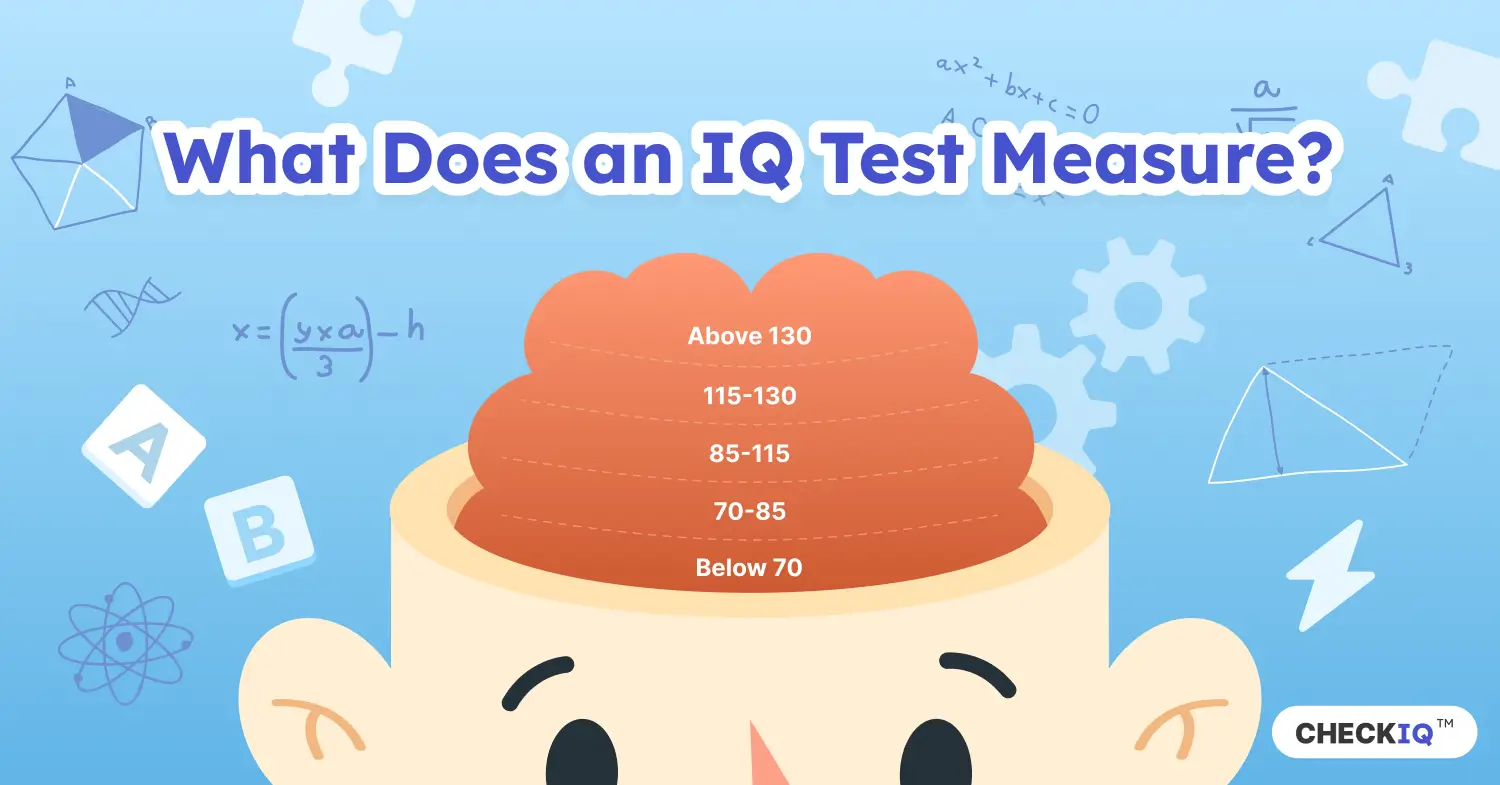Intelligence is a complex trait. It is also one of the most fascinating and sometimes controversial subjects in psychology!
At its core, intelligence encompasses your ability to learn, understand, and apply knowledge to manipulate your environment, solve problems, and adapt to new situations.
In today’s world, it's a common belief that intelligence is a fixed attribute. But this is only a part of the picture.
In truth, intelligence is dynamic, constantly interacting with myriad factors throughout your life.
Let’s dive in.
1. Is Intelligence Inherited or Acquired?
There is a genetic foundation
Researchers have identified specific genes linked to intellectual abilities, such as verbal skills and mathematical capabilities. They have found those in both parents and their children.
In addition, certain cognitive functions are tied to genetic components, with a substantial fraction of the variance in intelligence attributed to inherited genetic factors, according to recent research published in the scientific journal Nature.
The similarities in cognitive abilities between parents and their children show that intelligence has a strong inherited component.
The brain structure matters too
Studies, such as those conducted by the Faculty of Psychology at Ruhr-University Bochum, have shown that while our genes set the groundwork, the architecture of our brain, how it's structured and how well different parts communicate, is equally crucial.
For example, scientists have found that certain genes linked to intelligence can lead to a larger brain surface and more efficient pathways between brain cells. Important areas of the brain, such as the dorsolateral prefrontal cortex and the parietal lobe, are crucial for complex thinking tasks.
These insights show us that intelligence isn't only about the genes we get from our parents. It's also about how our brain's structure supports those genes.
But genes and your brain structure aren't the entire story, as you are going to find out…
A reliable 100% adaptive online IQ Test. Get your IQ score immediately.
Start My IQ Test
2. Your Environment Plays a Critical Role
"Give me a child until he is seven and I will show you the man."
This old proverb turns out to be true.
In fact, genetics only provide the initial script. From birth, environmental factors play a crucial role in shaping your intelligence. In fact, it can affect how your IQ changes over time.
Influence of your childhood and adolescent environment
It all starts when you’re a kid. American researchers found that young children who seek out lots of stimulation, like exploring new things or playing challenging games, tend to have higher IQs by the age of 11. A study of 1,795 children observed that those who were more curious and active at 3 years old scored on average 12 points higher on IQ tests than those who were less active. This pattern held true across different groups, regardless of their parents' education or job.
Thus, as you become a teenager, environmental factors such as urban living, regular physical activity, higher family income, and parents' education and occupation can affect your IQ. This is supported by research conducted on teenagers between the age of 12 and 16. Specifically, the research found that children that had a higher IQ score (over 120) had several things in common: they lived in cities, participated in over five hours of physical activity weekly, and came from higher-income families with well-educated parents, especially those with postgraduate degrees.
The impact of where you live
Researchers from Rutgers University emphasized that moving to a better place or growing up in a rich society can actually make someone's IQ go up. As odd as it may sound, whether someone reaches their full intelligence potential can depend a lot on their living conditions.
Supporting that being in a richer environment can influence intelligence, an analysis from psychology researchers from the University of Texas and the University of Edinburgh looked at how social class affects the impact of genetics on intelligence. First, they reviewed data from over 24,000 twin and sibling pairs from various countries. They were focusing on their family's socioeconomic status and their intelligence. After doing that, they concluded that in the US, being poor can make it harder for people's natural intelligence, set by their genes, to fully develop. However, this problem isn't seen in Western Europe or Australia. Likely because these places have stronger social welfare systems that help reduce the bad effects of being poor.
A study in Wisconsin also found that urban kids had higher average IQs than rural kids. This shows that where you live can affect your IQ.
The role of education and learning
Imagine if a year of schooling could add up to five points to your IQ. Would that change the way you view education? As it turns out, this isn't just hopeful thinking. In fact, it is supported by comprehensive research. Studies have shown that each extra year of schooling can boost your IQ by one to five points. This means that education is a powerful way to significantly improve a person's mind.
This challenges the old belief that intelligence is fixed. If more education can boost intelligence, it shows that cognitive growth is possible. Education doesn't just increase your knowledge; it also keeps your brain active, improving and expanding your cognitive abilities.
Social interactions matter
Have you ever thought about how the conversations you have, the debates you partake in, or the networks you develop can contribute to your intelligence?
That is another environmental factor at play. It is the social interactions and the impact they can have. These engagements can either stretch your cognitive muscles or leave them unchallenged.
Research by Jonathan Wai from Duke University, illustrates that America's top leaders, spanning various influential sectors, tend to come from a pool of individuals with high cognitive abilities and educational backgrounds, likely in part because of their exposure to intellectually stimulating environments. Another study found that people who interacted socially had better cognitive performance than those who interacted less.
So, how can we explain these findings? Well, these interactions introduce new viewpoints, challenge existing thought patterns. They also facilitate the sharing and testing of ideas. In essence, your brain becomes an arena for dynamic thought. It's through these social moments, whether in academic settings, the workplace, or casual encounters, that ideas are exchanged and cognitive development is cultivated.
3. How Can You Improve Your Intelligence?
Now that you know intelligence isn't just inherited but also influenced by your environment, here are some ways to boost it. For more details, check out our article about how to increase your IQ.

Play cognitive exercises
Your brain is remarkably adaptable, that’s the great news. So, brain training is a way to tap into this neuroplasticity.
According to Dr. Howard E. LeWine, Chief Medical Editor at Harvard Health Publishing, regularly engaging in new and challenging activities is one of the best ways to maintain brain health and build cognitive reserves. This process, known as brain plasticity, enables your brain to adapt and grow as you age. It helps counteract the natural cognitive decline associated with aging.
What are some cognitive exercises you might try? Puzzles, strategy games, and new language learning are all games that engage your brain. They help you grow new neural connections and impact neuroplasticity. So, think about that as your muscles grow with physical exercise. The same is what happens when cognitive exercises expand your mental capacity.
Educate yourself and learn
Recent research suggests that education impacts specific cognitive skills more than an overall general intelligence factor.
Research shows that higher education levels are linked to higher IQ scores. Long-term studies indicate that extended education improves specific cognitive skills like memory – which in turns influences your IQ –, processing speed, and verbal fluency, rather than just overall intelligence. This means targeted brain training can enhance these areas.
Moreover, regular reading has been shown to increase IQ. Engaging with diverse and challenging material stimulates the brain, enhancing cognitive functions.
So, read, listen to intellectual conversations, and watch things that challenge your brain. That will surely help you increase your IQ level.
Eat the right food
What you eat plays a vital role in your brain's function. Foods rich in omega-3 fatty acids, antioxidants, and vitamins give your brain the nutrients it needs to work well. Omega-3s, found in fish like salmon and mackerel, as well as in walnuts and flaxseeds, are particularly important.
A study by Loma Linda University supports this. They found that older adults who eat diets rich in omega-3s, like EPA and DHA, have better brain health. Higher omega-3 levels in the blood were linked to better memory, faster thinking, and thicker brain regions involved in memory.
Another study published in 2021 found that eating organic food is linked to higher IQs. The researchers found that school-age children who ate more organic food did better on tests of thinking and memory skills.
This suggests that eating the right foods can not only support overall brain health but can also improve specific cognitive functions as we age.
Exercise
While you may be aware that physical activity keeps your heart healthy, you should know it also enhances brain function.
Regular exercise improves memory and thinking skills, which are essential for overall cognitive performance. According to Harvard Health Publishing, physical activity changes the brain in ways that protect memory and thinking skills. Moreover, research by the American Psychological Association shows that older adults who spend more time in moderate to vigorous physical activity have better thinking and memory skills.
Get enough sleep
It is all about your lifestyle choices. These habits help ensure that your brain receives not only the stimulation it needs but also the rest and care required for optimal operation. Proper sleep, in particular, can boost your brain function. As advised by Cleveland Clinic, getting quality sleep is vital for cognitive health and overall energy.
Addressing sleep disorders and ensuring adequate sleep can enhance concentration, focus, and overall brain function. The National Sleep Foundation recommends 7-9 hours of sleep per night for adults, suggesting that even short naps can be beneficial if a full night's sleep isn't possible.
Socialize
Research from the University of Michigan found that people who socialize more often have better thinking and memory skills than those who socialize less. To boost your intelligence, try engaging in regular conversations, joining clubs, or participating in group activities.
4. Common Questions About Parents’ IQ and Kids’ IQ
Can a child outperform their parents in intelligence?
The answer is a BIG yes! While you know now that genetics lay the foundation for cognitive abilities, they don't set a firm ceiling. In many instances, children have intellectual achievements that surpass those of their parents. This shows that intelligence increase from parents to children is not only possible but quite common.

What contributes to this? In play there are various environmental factors. They include factors such as access to quality education, intellectual stimulation from a young age, and emotional support, which contribute greatly to the development of a child's intelligence. Additionally, your mindset can also influence your IQ
Do smart parents always have smart babies?
The apple doesn't fall far from the tree, they say, but how true is this for intelligence? It’s not a given that children of smart parents will automatically be smart. While intelligent parents are more likely to pass on genes conducive to high cognitive abilities, this is not the only determining factor.
As we’ve seen earlier in this article, the role of environmental factors can't be understated. That’s because they often act as a catalyst, or in other cases, as a hindrance to a child's cognitive development.
Furthermore, a longitudinal study by the University of Edinburgh demonstrated that intelligence at a young age significantly impacts academic success during teenage years. This implies that while smart parents may create an environment conducive to intellectual development, the children's intelligence and educational attainment are still individualized experiences influenced by a host of other factors.
Can identical twins have a different IQ?
Research using twins and adopted children has shown us how this works. Identical twins, who share all their genes, can still end up with different IQs. This mostly happens if they grow up in different places. The reason behind this is because of things like education, culture, and family life. They can boost or limit how intelligence develops.

So, even though genes set up the basics of our intelligence, our experiences and surroundings can change how this potential is expressed. For example, children adopted into supportive and enriching families often do better on IQ tests. This is what precisely shows that a good environment can make a big difference, no matter the child's genetic background.
Is intelligence inherited mostly from mothers?
No. It's a popular myth that intelligence mainly comes from mothers. However, this is an oversimplification.
Research by PhD students at the University of California in Davis has shown that intelligence depends on many factors, both genetic and environmental, and is not just inherited from the mother.
Studies on mice looking at specific genes and how they are passed down have added to our understanding, but they haven’t proven a clear connection between intelligence and getting genes from one’s mother.
Is low IQ inherited?
The question of whether low IQ can be inherited is complex. While genes do play a role in intelligence, they only explain about 20% to 50% of the differences in IQ among people. This means a child might inherit certain aspects of IQ from their parents, including low IQ, but it’s not a direct or certain inheritance.
However, as we’ve covered in this article, it's important to understand that many factors beyond genetics influence IQ. These include things like health, education, and the environment someone grows up in. So, while there is a genetic component, it's not the only factor that determines someone's IQ. Understanding the signs of low IQ can help provide a clearer picture of how these various factors manifest in daily life and impact overall cognitive abilities.








